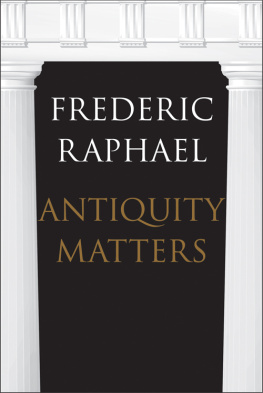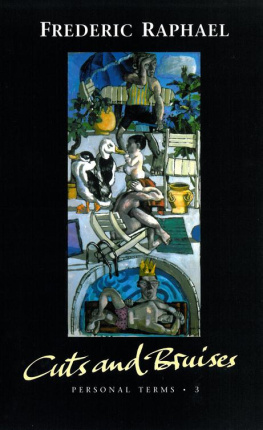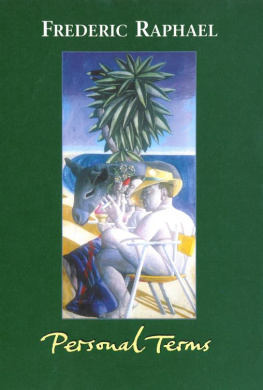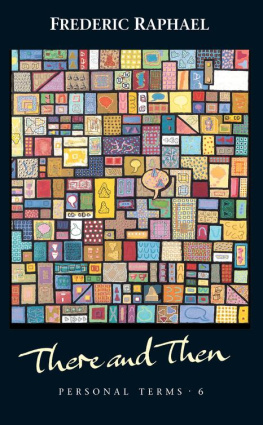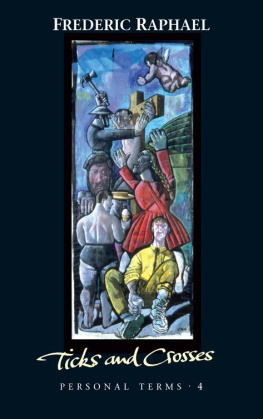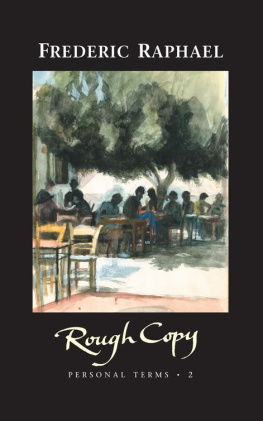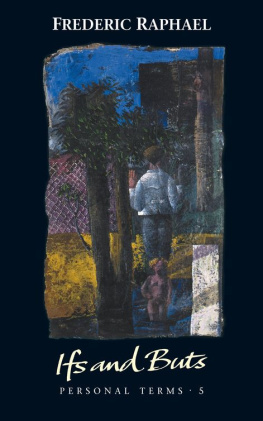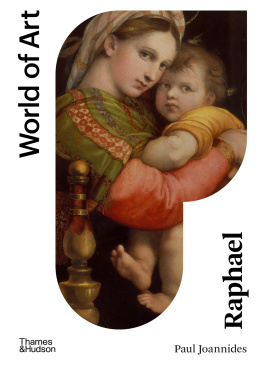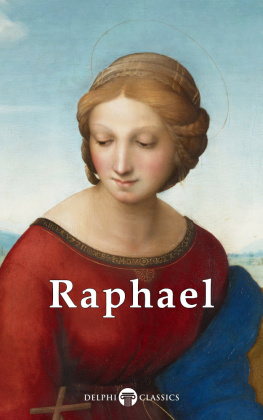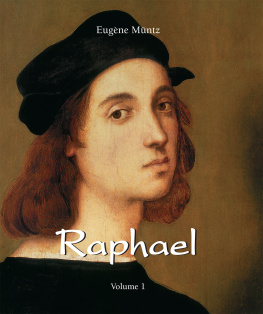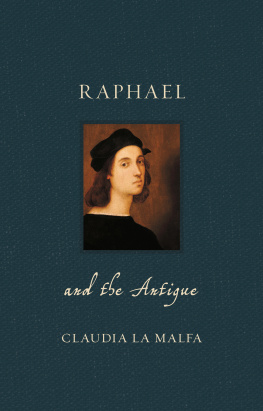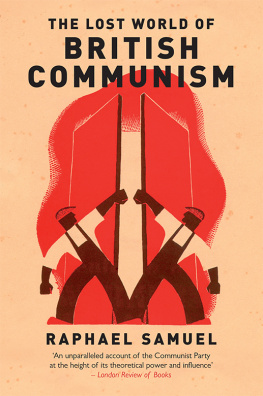Antiquity Matters

Published with assistance from the foundation established in
memory of Amasa Stone Mather of the Class of 1907, Yale College.
Copyright 2017 by Frederic Raphael.
All rights reserved.
This book may not be reproduced, in whole or in part, including
illustrations, in any form (beyond that copying permitted by
Sections 107 and 108 of the U.S. Copyright Law and except by
reviewers for the public press), without written permission from
the publishers.
Yale University Press books may be purchased in quantity for
educational, business, or promotional use. For information, please
e-mail
(U.K. office).
Set in Minion type by IDS Infotech Ltd.
Printed in the United States of America.
Library of Congress Control Number: 2017933336
ISBN 978-0-300-21537-3 (hardcover : alk. paper)
A catalogue record for this book is available from the British
Library.
This paper meets the requirements of ANSI/NISO Z39.481992
(Permanence of Paper).
10 9 8 7 6 5 4 3 2 1
For the wise man, Greece is everywhere.
PHILOSTRATUS (3rd century C.E. )
You never step into the same past twice.
FEDERICO GARCIA LORCA (20th century C.E. )
Oh those Greeks! They knew how to live: what is needed for
that is to stop bravely at the surface, the fold, the skin: to
worship appearance, to believe in shapes, tones, wordsin
the whole Olympus of appearance!
FRIEDRICH NIETZSCHE (19th century C.E. )
Skammenous dromous xanaskavo.
(Ways already excavated, I dig up again.)
GEORGE SEFERIS (20th century C.E. )
Contents
Introduction
I am an accidental classicist. Born in Chicago, Illinois, in 1931, with every expectation of growing up in America, chance dictated that I should become a pupil at an English preparatory school in September 1939. My father had been transferred to London from the Rockefeller Center offices of Shell Oil, in New York City, just over a year earlier. The plan was that we remain in England for a year, during which he would qualify for a more important position, and then return to the U.S. My place at the Ethical Culture School, on Central Park West, was waiting for me. When, with great reluctance, the British prime minister, Neville Chamberlain, declared war on Hitlers Germany, my father, who was a British subject, was asked to stay in London and apply his expertise to the war effort. Of course he agreed.
It was never intended that I should go to boarding school, but my parents thought I would be safer in the countryside than in the capital, which, within a few months, became the target of Hermann Goerings bombers. As France fell and Britain retreated, defiantly, on itself, I was set to learn amo, amas, amat (I love, thou lovest, he or she loves) from Kennedys Latin Primer. Had I not left New York City, I should never have been introduced at so young an age, if at all, to the dead languages of European civilization just as the continent was being overrun by what Greeks and Romans, for all their differences, would both have regarded as the forces of barbarism.
I began to learn Greek, with its arcane script, when I was eleven years old. Its grammar was even more complicated than Latin (its formal texts were dressed with a sprinkle of accents, perispomenon and otherwise, none authentically ancient); its mythology was superbly rich, improbable, dramatic, and bloody. By the time I was fourteen, I was writing iambic verses in the style of Sophocles (the most English, because the most restrained, of the three great Attic dramatists) and Greek prose that mimicked Demosthenes, the Athenian leader whose brave speeches against Philip of Macedon had something in orotund common with Winston Churchills diatribes against Adolf Hitler.
The British academic cursus honorum would take me first to Charterhouse public school and then to St. Johns College, Cambridge. On the way, I learned, with increasing proficiency, to write Latin elegiacs and hexameters in the style of Virgil and Ovid, Latin prose in that of Cicero and Julius Caesar. By the time the war was won, in August 1945, I had been converted from a small American boy to an English adolescent, a properly accented (with long Boston-style as) collector of scholarships. My father, who had read GreatsLatin and Greek literature and philosophyat Oxford, decided that it would be unfair to transport me back to the U.S.A., where mastery of ancient irregular verbs would do me little good.
Happiness was not the first concern of middle-class British males in the first half of the twentieth century; practical utility plays little part in an aspiring gentlemans education. The study of Latin and Greek was held to inculcate a sense of perfect pitch, in language and logic. The first-class mind (almost always male) could be relied on to have an infallible sense of when people were talking rot. Culture, in Matthew Arnolds sense, supplied the groundwork of common decency.
The classicist was advised to be modest in conduct and appetite. Nothing in excess was the Delphic motto that marked the stylish. The authors whom we were advised not to study, even at university, were those who by their unsavory content and intemperate vocabulary set a Bad Example: writers such as Suetonius, Archilochus, and Martial (not to mention gross chunks of Catullus) were particularly deplorable. We were incited to imitate Ovids flawless technique, even though, when it came to shamelessly erotic verses, He Should Have Known Better. Passages deemed obscene were left untranslated in the Loeb editions (of en regard translations from Latin and Greek). It was, of course, our early ambition to be able to decipher the dirty bits.
When I went up to Cambridge, in the autumn of 1950, I had had a full decade of the classics in their exemplary and, mostly, unamusing aspects. I had won several scholarships but soon realized that I was never going to be as good a scholar as my contemporary at St. Johns College, John Patrick Sullivan. The son of a Liverpool dock worker, John Patrick had had Latin and Greek grammar beaten into him, very memorably, by the Jesuits. Like Doctor Johnson, the booksellers son who came from a provincial Lichfield to become the Grand Cham of Regency London letters, Sullivan was living proof that the classics could be the means by which clever outsiders rose to intellectual eminence. Unable to match him in philology, I veered away into ancient history and philosophy, ancient and modern. I soon became an earnest convert to Ludwig Wittgensteins therapeutic positivism. I was also quick to follow Karl Poppers lead in regarding Plato as the prime source of totalitarian absolutism.
Since my unwavering ambition was to be a novelist, I was also happily seduced by classical anthropologists such as George Thomson and by the manifold versatility of Robert Graves, who went to Charterhouse and was at Oxford with my father. The author of I, Claudius and Claudius the God (based on the wicked Suetonius) indicated that the classics had more juice in them than the Old School cared to advertise. He relied on Suetonius for the delightfully salacious details of the imperial household, from which Claudiuss wife Messalina absented herself in order to enjoy playing the common prostitute in a Roman brothel.
Greece and Rome did not become three-dimensional realities until several years after I had abandoned their formal study. In the second half of the 1950s, I published three novels and wrote TV plays and films. In 1961, my wife and our two small children and I went to live first in Spain, then in Rome. I found that the ancient world was still three-dimensional. Its monuments and its modernized language charged me with an interest I had never felt before. Spanish and Italian came easily to me, thanks to Cicero and Tacitus.
Next page
